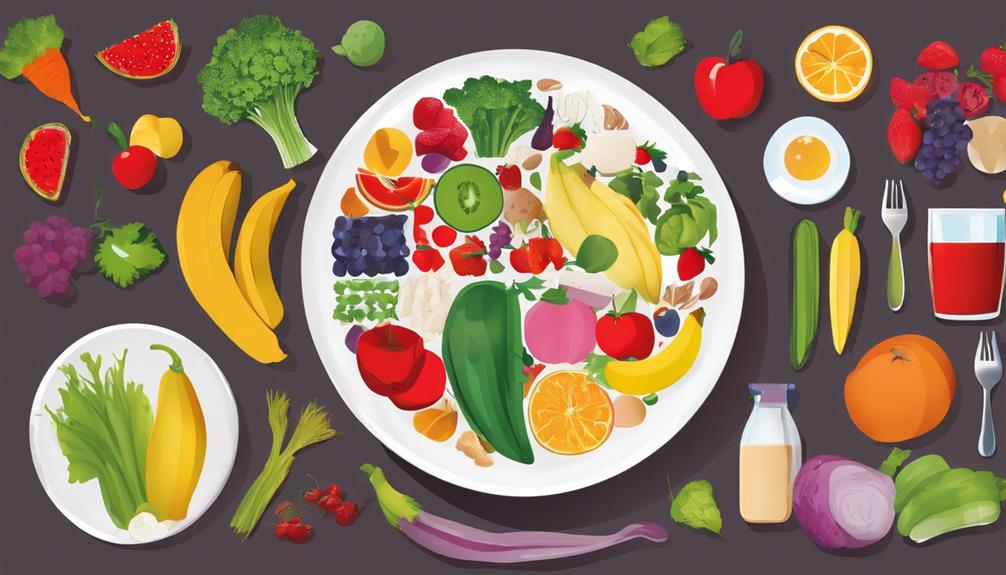As breastfeeding mothers, we are constantly reminded of the incredible benefits our milk provides to our little ones. Did you know that breast milk contains antibodies that help protect babies from infections and diseases?
However, ensuring our diet supports this precious nourishment can sometimes be a challenge. So, where should we start when it comes to maintaining a healthy diet during breastfeeding?
Key Takeaways
- Consume nutrient-dense foods for milk production and energy.
- Hydrate with water and fluids to support milk supply.
- Include balanced macronutrients for optimal health and well-being.
- Aim for additional calories and omega-3 fatty acids for breastfeeding nutrition.
Nutrient-Rich Foods for Breastfeeding Moms
What nutrient-rich foods should breastfeeding moms prioritize to support best milk production and overall health for both themselves and their baby?
Lean proteins such as chicken, fish, beans, and nuts are essential for supporting milk production.
Dark green and yellow vegetables like spinach, sweet potatoes, and bell peppers provide important vitamins and minerals necessary for both mother and baby's health.
Fruits like berries, oranges, and bananas not only offer fiber and antioxidants but also significant nutrients during breastfeeding.
Whole grains such as brown rice, whole wheat bread, and oatmeal help sustain energy levels and provide much-needed carbohydrates.
Incorporating dairy products like milk, yogurt, and cheese into the diet is beneficial as they offer calcium, protein, and other nutrients necessary for bone health and overall well-being while breastfeeding.
These nutrient-rich foods play a significant role in supporting milk production, maintaining energy levels, and ensuring important nutrition for both mother and baby during the breastfeeding journey.
Hydration Tips for Nursing Mothers

Staying adequately hydrated is important for nursing mothers, with a recommended daily intake of 8-10 cups of fluids to support best milk production and overall well-being. Water is the top choice for hydration while breastfeeding because it aids in milk supply. Dehydration can impact milk production, so it's essential to drink fluids regularly.
Herbal teas, milk, and 100% fruit juices also contribute to overall fluid intake. Monitoring urine color is a simple way to make sure you're getting enough fluids; a pale yellow color indicates good hydration. Remember, your baby's need for breast milk is directly linked to your fluid intake, so keep a water bottle handy during nursing sessions.
Managing Caloric Intake While Breastfeeding
To effectively support milk production while breastfeeding, managing caloric intake is important for meeting the increased energy needs of nursing mothers. Breastfeeding mothers require an additional 450-500 calories per day to sustain milk production.
It's vital to consume nutrient-dense foods and pay attention to hunger cues to meet these energy demands. Eating small, frequent meals and snacks throughout the day can help maintain energy levels. Utilizing tools like the MyPlate Plan can assist in determining the appropriate calorie intake tailored to individual needs.
Consulting with a healthcare provider is beneficial in establishing a healthy eating routine that aligns with breastfeeding demands and supports milk production. By listening to your body's cues and incorporating a variety of nutrient-rich foods, you can make sure that you're meeting your caloric needs while providing essential nutrients for both you and your baby.
Balancing Macronutrients for Optimal Health

Balancing macronutrients during breastfeeding is essential to guarantee ideal health for both the mother and the baby, requiring adequate intake of carbohydrates, proteins, and fats. Carbohydrates play a vital role in providing energy, making it important to include whole grains, fruits, and vegetables in your diet. These foods not only fuel your body but also support your baby's growth and development.
Proteins are essential for tissue repair and muscle function, so incorporating lean meats, poultry, fish, beans, and dairy products is important during breastfeeding. Additionally, healthy fats containing omega-3 and omega-6 fatty acids are crucial for brain development in infants; include sources like fish, nuts, seeds, and avocados in your meals.
Ensuring a balanced intake of macronutrients not only supports energy levels and milk production but also contributes to overall health and well-being for both you and your baby. By making conscious choices in your diet and focusing on these essential macronutrients, you can optimize your nutrition and promote a healthy breastfeeding journey.
Special Considerations for Breastfeeding Diet
Moving from the discussion on macronutrient balance for ideal health, a breastfeeding diet necessitates specific considerations to support both maternal well-being and infant development. Breastfeeding mothers should aim to consume an additional 450-500 calories daily to sustain milk production. Including nutrient-dense foods such as lean proteins, whole grains, fruits, and vegetables is important for a well-rounded breastfeeding diet.
Adequate hydration is essential, with a recommended intake of about 13 cups of fluids daily to support milk supply. Omega-3 fatty acids, commonly found in fish like salmon and sardines, play an important role in infant brain development and are beneficial for both the mother and the baby.
Limiting the consumption of processed foods, added sugars, and caffeine can help maintain overall health and energy levels during breastfeeding. By focusing on wholesome, nourishing foods and staying hydrated, breastfeeding mothers can optimize their nutritional intake to support both their own well-being and their infant's development.
Frequently Asked Questions
What Are the Guidelines for a Healthy Diet When Breastfeeding?
We focus on a balanced diet during breastfeeding. Prioritize nutrient-dense foods like fruits, veggies, lean proteins, whole grains, and low-fat dairy. Stay hydrated with water, limit sugary drinks, and include safe seafood for omega-3s. Consult experts for personalized guidance.
What Is a Healthy Diet for Breastfeeding Moms?
Understanding the importance of a healthy diet for breastfeeding moms. Prioritize nutrient-dense foods like whole grains, lean proteins, fruits, and veggies. Hydrate well and include omega-3 sources for infant brain development. Consult healthcare providers for personalized guidance.
What Are the Dietary Guidelines for Breastfeeding?
We recommend increasing calorie intake by 500 daily for breastfeeding. Include nutrient-rich foods like lean proteins, whole grains, fruits, veggies, and dairy. Hydrate well with water. Limit processed, sugary, high-fat items. Consult healthcare experts for personalized nutrition guidance during breastfeeding.
How Do I Plan a Diet for a Lactating Mother?
We plan a diet for a lactating mother by choosing nutrient-rich foods like fruits, vegetables, lean proteins, and healthy fats. We consult healthcare providers or dietitians for personalized plans that support milk production and overall well-being.
Conclusion
To sum up, nourishing our bodies with nutrient-rich foods while breastfeeding is like fueling a well-oiled machine. By incorporating a balanced diet and staying hydrated, we can support both our own health and that of our little ones.
Remember, a healthy diet is the key to thriving during this special time. Stay committed to making smart food choices and watch as you and your baby flourish together.










